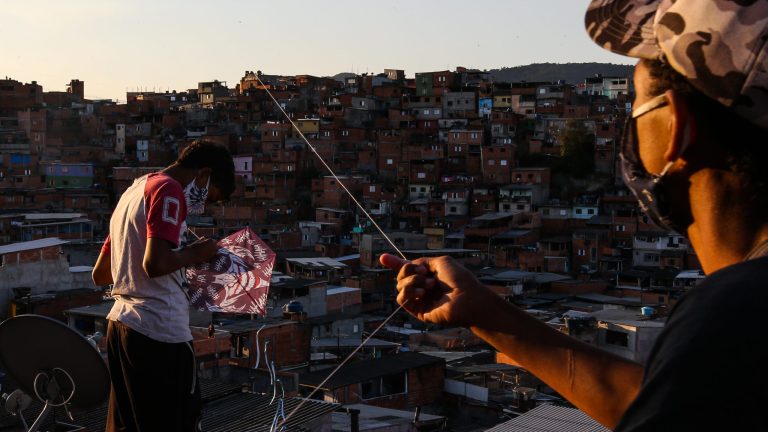Above the treetops and shabby rooftops of Brazil’s favelas, hoards of colorful kites soar across the sky on any given day. In these densely populated and poverty-stricken neighborhoods, the centuries-old game of kite fighting draws people of all ages.
Kite fighters do everything they can to bring down the kites of their opponents — including using strings doused with wax, or sharp materials like glass or quartz, which turn kite lines into razors.
Once a string plummets from the sky, it becomes a hazard for pedestrians, motorcycle riders, and vehicles, with the potential to cause grievous injuries. In February, legislators began discussing a nationwide ban on the sharp kite lines — already outlawed in 15 states and over a dozen municipalities across Brazil in the last few years, in some cases as early as 2001. But content creators have fueled a black market where the kite lines remain readily available.
Rest of World found more than 20 creators across Instagram, Facebook, and TikTok advertising the sharp kite strings, with some selling them through marketplaces like Shopee. The creators use secret codes to refer to different types of cerol — as the sharp lines are called — to fly under the radar of authorities.

The state should “have the power to monitor and apply administrative sanctions, including for online sales,” Gustavo Brito, chief of staff for Coronel Telhada, a Brazilian politician who has been pushing for the nationwide ban, told Rest of World.
Pipa Combate, a YouTube channel with nearly 3 million subscribers, promotes kite-fighting culture through its videos. The channel also advertises a virtual kite-flying app, which has been downloaded over 50 million times since its launch in 2015.
In late 2023, the State Bureau for Justice and Public Security in Minas Gerais, Brazil’s second most populous state, launched an online campaign to curb the use of the kite strings. It nudged citizens to publicly denounce illegal online and offline sales of the strings, and their manufacturing, following an increase in related accidents.
“[These strings] cause cutting lesions, mostly in the neck area to people on bicycles or motorcycles, that can cause hemorrhages and end up in the victim’s death,” a spokesperson for the Military Police of São Paulo State told Rest of World. Some strings are so sharp that they cut through the aluminum components of cars.
Kite fighting in Brazil has soared in recent years, according to Luciano, a content creator who has run the Escola do Pipeiros account on Instagram since 2012. “Before the pandemic, kite flying was most popular during the period of good winds,” Luciano, who only gave his first name, told Rest of World. “After 2020, the practice has been happening every day.”
The post-pandemic resurgence in kite fighting has led to an uptick in related accidents. Between March 2020 and February 2021, Enel, an energy company in São Paulo, reported 13 accidents that involved kite strings damaging high-voltage electricity lines and causing several blackouts across the state. Enel did not respond to a request for recent data from Rest of World.
According to the military police of São Paulo, Brazil’s most populous state, the number of personal accidents associated with sharp kite lines rose from 17 to 25 between 2021 and 2023.
Some of the creators often link to stores on online marketplaces like Shopee, which sell the banned kite lines under names like “competition strings.” The listings mention technical details about the products, but do not specify that they are used for kite fighting, helping sellers skirt the ban. “This one makes the best cut,” promises one TikTok post, directing followers to Shopee’s marketplace.
Shopee did not respond to a request for comment from Rest of World.
There are other made-up names that creators and brands use to refer to the cutting strings, and avoid detection by law enforcement. Linhas Nasa, a popular brand, has an Instagram post with a list of keywords for the different kinds of sharp coatings. Strings soaked in carbide, a cutting metal often used in drills, are known as Cb; those coated in quartz, a hard metal that can scratch glass, are labeled pó azul. Another term is pó de marte, used for aluminum dust coating, which is corrosive. Linhas Nasa also has its own Shopee store, and its website lets people place orders using Pix, Brazil’s most popular digital payments system.
Some creators blatantly promote cutting-strings. A brand called Guilhotina Linhas Especiais — its name is a nod to the guillotine — makes little effort to hide the purpose of the kite strings it sells on Shopee. A description of one of its best-selling items mentions its “high cutting power.” The brand’s store has been on Shopee for over two years.
The kite lines are particularly threatening for gig workers who spend hours zooming across cities each day.

“Last year, a co-worker died after being hit by a kite line coated with wax. Unfortunately, he did not survive the injury; his wife and children were left helpless,” Abel Santos, vice president of the Federal District Association for App Workers and Motorcyclists (ATAM-DF) in Brasília, told Rest of World. “The laws that prohibit the use of cutting kite strings are not respected.”
Cerol-related accidents have created a market for string-cutting antennas, which workers install on their bikes to reduce the risk of being hit. These antennas are available in stores specializing in motorcycle gear in downtown São Paulo, as well as online on platforms like Argentina’s MercadoLibre.
Some local governments have made the kite-cutting antennas mandatory for motorcycle riders. Last year, municipal authorities in the city of Campinas, which has nearly 119,000 registered motorcycles, gave away 2,100 protective antennas to riders — 20% more than it did in 2022.
In 2023, Telhada introduced a bill in Brazil’s Congress to ban the coated kite strings nationwide. The bill also called for a fine and a prison sentence of up to three years for those who use or manufacture cerol. Part of Telhada’s plan includes creating reserved spaces for kite fighting, called pipodromos.
Creators argue that kite fighting will continue — ban or no ban. “A small group of people want to establish the rules for thousands of pipeiros [kite flyers],” said Luciano. “It will not work, and the people who will pay a higher price for it are the people who make a living by selling kites.”



